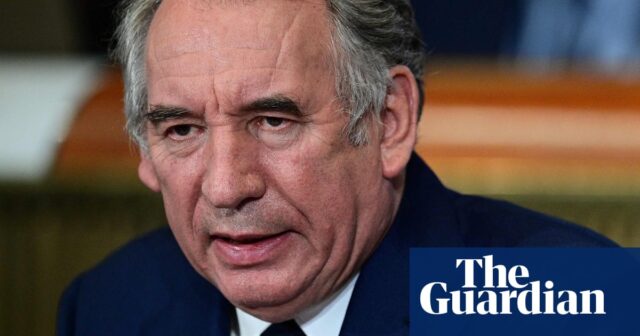François Bayrou, a veteran centrist and ally of president Emmanuel Macron, has been appointed French prime minister, after last week’s historic vote of no-confidence ended the beleaguered and short-lived minority coalition of the rightwing Michel Barnier.
Bayrou, 73, is the leader of the centrist MoDem party and a political heavyweight from south-western France who calls himself a “man of the countryside”. A former education minister, and mayor of the south-western town of Pau, he has been an ally and close confidente to Emmanuel Macron since he swept to power in 2017.
Bayrou is the fourth French prime minister this year as France has struggled with a growing political crisis in a divided parliament. Barnier’s government was ousted last week after only three months in office, and Macron wants to avoid a new government facing the same fate.
Since Macron called an inconclusive snap election in June, the French parliament has been divided between three groups with no absolute majority. A left alliance took the largest number of votes but fell short of an absolute majority; Macron’s centrist grouping suffered losses but is still standing; and the far-right National Rally gained seats but was held back from power by tactical voting from the left and centre.
Those divisions remain and the first task of the new prime minister is to appoint a government that can work with parliament to pass a full budget for 2025.
Thomas Cazeneuve, a centrist MP from Macron’s party, had described Bayrou as an experienced politician who had “the art of compromise”.
But the political veteran raises hackles on both the left – who say he will continue Macron’s policies – and on the right, where he is personally disliked by the influential former president Nicolas Sarkozy, whom he ran against in the 2007 presidential race.
Politicians on the left had earlier criticised the choice of Bayrou, saying his appointment would mean “continuity” for Macron and did not respect the snap election result in which the left alliance won the most number of votes even if it fell short of a majority.
Manon Aubry, of Jean-Luc Mélenchon’s leftwing La France Insoumise, told Europe 1 her party’s view of Bayou before the appointment: “He is the very embodiment of Macronism. How is it that when Emmanuel Macron loses an election he wants, at any price, to impose the colour and continuity of his own politics? … That does not work”.
after newsletter promotion
The Socialist Boris Vallaud had said that if Macron appointed someone from his own centrist grouping “it risked worsening the political and institutional crisis” that the president had created.






